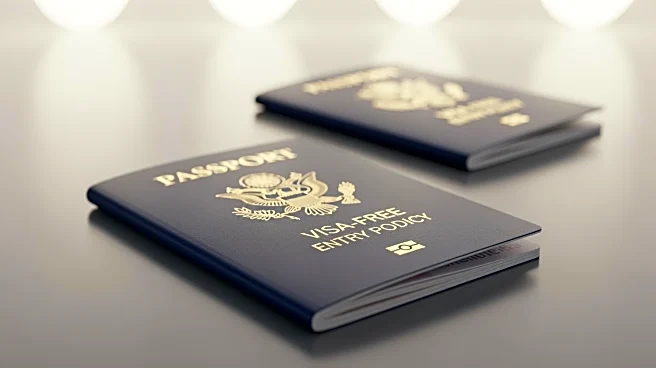What's Happening?
China has announced an extension of its visa-free entry policy for citizens from 45 countries, including Australia, New Zealand, and several European nations, until December 31, 2026. This policy allows
visitors from these countries to enter China for business, tourism, family visits, or transit for up to 30 days without a visa. The extension aims to revive China's tourism sector, which has been significantly impacted by strict COVID-19 controls. However, the United States, Canada, and the United Kingdom are notably excluded from this scheme. The decision comes amid ongoing trade tensions, as China seeks to strengthen ties with the European Union, a key trading partner. Additionally, China has suspended its expanded rare earth export controls for a year, a move announced after a meeting between President Xi Jinping and President Trump in South Korea.
Why It's Important?
The extension of the visa-free policy is a strategic move by China to boost its tourism industry and enhance foreign engagement, particularly with countries that are significant trading partners. By excluding the U.S., Canada, and the UK, China signals ongoing diplomatic and trade tensions with these nations. The decision to suspend rare earth export controls also highlights China's efforts to alleviate trade tensions with the European Union, which could have significant implications for global supply chains. The exclusion of major Western countries from the visa-free policy may impact diplomatic relations and economic interactions, potentially influencing future negotiations and trade agreements.
What's Next?
China's decision to extend the visa-free policy and suspend rare earth export controls may lead to increased diplomatic engagement with the European Union and other included countries. The U.S., Canada, and the UK may respond by reassessing their diplomatic strategies and trade policies with China. The continuation of communication between China and the EU could lead to further agreements aimed at stabilizing industrial and supply chains. Observers will be watching for any shifts in China's foreign policy that might include or exclude other nations from similar initiatives.
Beyond the Headlines
The exclusion of the U.S. from the visa-free policy could be seen as a reflection of broader geopolitical dynamics, where China is seeking to strengthen alliances with countries that are more aligned with its economic and political interests. This move may also be part of a larger strategy to diversify China's international partnerships and reduce reliance on Western economies. The suspension of rare earth export controls is particularly significant given the critical role these materials play in technology and defense industries, potentially affecting global markets and innovation.











